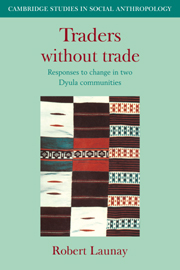1 - Introduction: the people and the problem
Published online by Cambridge University Press: 15 October 2009
Summary
… I am as you are, a Julietto, which signifies a Merchant, that goes from place to place …
Buckor Sano to Richard Jobson, Gambia, 1621The Dyula
In the various dialects of the Manding language, the word dyula has several meanings. Some of these are of unquestionably recent vintage; indeed, they are unintelligible outside the modern colonial and postcolonial contexts. But at least two meanings of the word are far older. By far its most universal meaning, and almost certainly the oldest, is ‘an itinerant trader’. For the most part, the word referred specifically to Moslem traders who spoke one of the dialects of Manding as a first language.
The extensive participation of Manding-speaking peoples in trade has a very long history, dating at least as far back as the medieval empire of Mali, the predominant power in the Western Sudan from the thirteenth to the sixteenth centuries (Levtzion 1973:63). However, certain groups of Manding-speaking traders, for instance the Marka and the Diakhanke, trace their origins even further back to the Soninke empire of Ghana which flourished in the ninth to eleventh centuries a.d. Originally, these Manding traders were collectively known as the Wangara. In the words of the seventeenth-century chronicler Mahmoud Kati:‘… the Wangara and the Malinke are of one origin, but “Malinke” denotes warriors, whereas “Wangara” signifies merchants who ply their trade from country to country’ (Kati 1964:65).
- Type
- Chapter
- Information
- Traders Without TradeResponses to Change in Two Dyula Communities, pp. 1 - 10Publisher: Cambridge University PressPrint publication year: 1982



